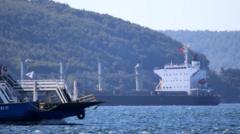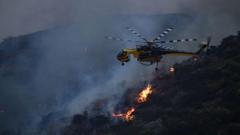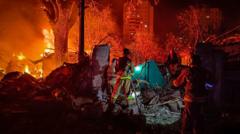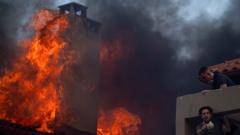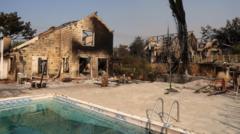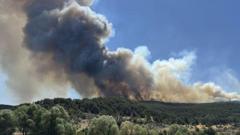As wildfires rage near Patras, Greece's third-largest city, thousands of residents face evacuation while extreme temperatures and winds exacerbate the crisis. Amidst a broader heatwave impacting several European nations, urgent firefighting efforts are underway, highlighting the growing intensity of climate-related disasters.
Major Greek City Faces Threat from Wildfires Amidst Severe Heatwave

Major Greek City Faces Threat from Wildfires Amidst Severe Heatwave
Patras grapples with fast-spreading wildfires, prompting evacuations and destruction as a significant heatwave sweeps through southern Europe.
A major Greek city, Patras, is currently under severe threat due to fast-moving wildfires exacerbated by extreme heat and gusty winds impacting southern Europe. With the temperature soaring to 38°C, the fires threaten the outskirts of Patras, prompting urgent evacuations, including that of a children's hospital, as dark plumes of smoke choke the city’s skyline.
The rapid spread of the fires has already consumed nearly 10,000 hectares in the Achaia region over just two days, resulting in widespread destruction. Entire villages have been abandoned, homes and businesses reduced to ashes, and over 500 vehicles, including those at a customs yard, have been incinerated. The once-bustling streets of Patras were eerily quiet on Wednesday, with only a few residents watching the approaching flames, while the scorching winds continued to fuel the fires.
In response to the escalating situation, authorities ordered the evacuation of a town with a population of around 7,700, while new alerts were issued for additional villages nearby. The Greek government has sought assistance from the EU, requesting water bombers to supplement the efforts of more than 4,800 firefighters currently battling over 20 wildfires across the country.
The crisis in Greece coincides with a severe heatwave affecting the broader southern European region, sparking significant wildfires from Portugal to the Balkans. In Spain, the toll of the heat was tragically marked by the deaths of a civilian and a volunteer firefighter during what has been the tenth consecutive day of extreme temperatures, with peaks reaching 45°C.
Amid this alarming climate situation, political tensions have surfaced as Spain's transport minister, Oscar Puente, faced backlash for suggesting the context of the ongoing wildfires in Castile and León, particularly targeting the region’s conservative leader for vacationing during the crisis. As opposition figures call for accountability, the urgency of the crisis is compounded with over 199 wildfires recorded nationwide this year, burning nearly 99,000 hectares, substantially surpassing last year’s figures.
In neighboring Portugal, firefighting efforts are similarly underway with 1,800 firefighters deployed to combat five significant blazes, including one reignited by lightning in Trancoso. Albania declared a "critical week" with 24 active wildfires forcing evacuations. Italy managed to control a blaze on Mount Vesuvius while grappling with extreme heat warnings in 16 cities, including Florence.
As the unprecedented heatwave continues to impact various regions, health officials in Britain forecasted temperatures peaking at 34°C, emphasizing the strain on care services. Meteorologists warn that such severe weather patterns are becoming increasingly frequent and intense, emphasizing the urgent need for action in the wake of human-induced climate change and its catastrophic consequences.





